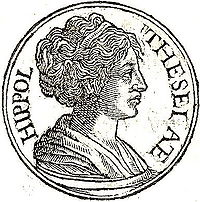Hippolyta: Difference between revisions
ClueBot NG (talk | contribs) m Reverting possible vandalism by 209.104.245.141 to version by 28bot. False positive? Report it. Thanks, ClueBot NG. (1064591) (Bot) |
Tag: repeating characters |
||
| Line 39: | Line 39: | ||
{{s-bef|before=''[[Otrera]]''}} |
{{s-bef|before=''[[Otrera]]''}} |
||
{{s-ttl|title=[[Queen regnant|Queen]] of the [[Amazons]]|years=}} |
{{s-ttl|title=[[Queen regnant|Queen]] of the [[Amazons]]|years=}} |
||
{{s-aft|after=[[Penthesilea]]}} |
{{s-aft|after=[[Penthesilea]]}} YOU LICK PUSSSSSSSSSSSSSSSSSSY!!!!!!! |
||
{{end}} |
{{end}} |
||
{{Characters in A Midsummer Night's Dream}} |
{{Characters in A Midsummer Night's Dream}} |
||
Revision as of 15:31, 9 May 2012
This article needs attention from an expert in Mythology. Please add a reason or a talk parameter to this template to explain the issue with the article. (March 2008) |
This article needs additional citations for verification. (December 2011) |
In Greek mythology, Hippolyta or Hippolyte (Ἱππολύτη) is the Amazonian queen who possessed a magical girdle she was given by her father Ares, the god of war. The girdle was a waist belt that signified her authority as queen of the Amazons.

Hippolyta appears in the myth of Heracles. It was her girdle that Heracles was sent to retrieve for Admeta, the daughter of king Eurystheus, as his ninth labor. Most versions often begin by saying that Hippolyta was impressed with Heracles, and gave him the girdle without argument.
After Heracles obtained the girdle, Theseus, one of Heracles' companions (along with Sthenelus and Telamon), kidnapped Antiope, another sister of Hippolyta. The Amazons then attacked the party (because Heracles' enemy Hera had spread a vicious rumour that Heracles was there to attack them or to kidnap Hippolyta), but Heracles and Theseus escaped with the girdle and Antiope. According to one version, Heracles killed Hippolyta as they fled, which upset him as due to their earlier excellent rapport he would have wanted to marry Hippolyta. In order to rescue Antiope, the Amazons attacked Athens but failed, with Antiope dying in the onslaught in some versions.
In some versions, it is not Antiope whom Theseus abducts, but Hippolyta herself.
Some sources paint Theseus in a more favorable light, saying that Hippolyta was dead before he and Phaedra were wed.
Hippolyta in A Midsummer Night's Dream
This section may lend undue weight to certain ideas, incidents, or controversies. (December 2011) |
In William Shakespeare's A Midsummer Night's Dream, Hippolyta is engaged to Theseus, the duke of Athens.
In Act I, Scene 1 Hippolyta and Theseus discuss their fast-approaching wedding, which will take place under the new moon in four days. Theseus declares to Hippolyta that, although he "wooed her with his sword" (which probably occurred when Theseus met the queen of the Amazons in battle), he will wed her "with pomp, with triumph, and with revelling" and he promises to begin a celebration that will continue until the wedding (I.i.19).
Hippolyta is then fairly absent in the play, appearing only with Theseus and very rarely speaking, and only then in an insignificant manner. This continues until Act V, scene I, in which she and Theseus discuss the preceding events, namely the magical romantic confusions that the Athenian youths report from the night before. While Theseus is skeptical about the veracity of their tale, Hippolyta questions whether they would all have the same story if the night's adventures were indeed imagined. Rather, she argues, the youths' agreement on the way the night's events unfolded proves that things occurred just as they say. This is close to her final significant contribution to the play.
The fact that Hippolyta stands up to Theseus when she disagrees with him in Act V is extremely significant. In Shakespeare's time, it was common practice for the wife to be the submissive, silent partner in a relationship. Hippolyta's role in her relationship with Theseus is indeed striking. Ellen Rogers of Madonna University delves further into the significance of Hippolyta's role in A Midsummer Night's Dream. She states that the play is unusual in its portrayal of strong women, perhaps the most extreme case being that of the Queen of the Amazons, Hippolyta. In the Elizabethan age in which women are dependent on men, Hippolyta comes from a tribe of incredibly strong empowered women. Not only this, but she is the leader of this group in which men are actually dependent on the fearless women who protect them.
Rogers argues that Shakespeare uses the character of Hippolyta to enlighten his audience, who probably had negative preconceptions about the Amazonian race. It is also worth considering that her statement of "I love not to see wretchedness o'er-charged" (5.1.89), and her subsequent compassionate behavior during the Mechanicals' performance (quite different from the behavior of the other nobles present) was a not-so-subtle indication of how Shakespeare may have preferred his own audiences to behave.
As Louis Montrose notes: "Amazonian mythology seems symbolically to embody and to control a collective anxiety about the power of a female not only to dominate or reject the male but to create and destroy him."[1] However, Hippolyta attracts Theseus with her feminine allure and charm, to such a degree that Theseus is completely smitten with her. Despite her forceful nature, she becomes the object of Theseus' passion. Rogers states that by marrying Hippolyta, Theseus is laying down his sword, "the weapon which gave him power and authority over her," and essentially surrendering to her. By the end of the play, Hippolyta has actually added to her power, becoming the queen of a new realm, Athens.[2]
Hippolyta also appears in The Two Noble Kinsmen, a play co-written by Shakespeare and John Fletcher
